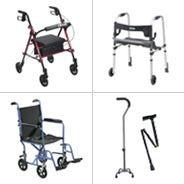Your Cart is Empty
Tips & Advice Center: General Mobility Information

Walkers and Crutches and Canes, Oh My! >>
Do I Need More Than One Product? >>
Daily Aids Make It Easier >>
Any Further Questions? >>

Walkers and Crutches and Canes, Oh My!
Choosing the right mobility aid for you depends on more than what meets the eye. Maybe your doctor or insurance provider gave you a simple pair of crutches to use for your rehabilitation, or you got a walker to help your balance. Can you be certain that it's really your best option? Many times, people are using something they consider cumbersome, difficult, or just plain painful, but they don't know there are other options. This guide will help you pick the item that best suits your needs. Whether you are looking for something to make getting around quick and easy, or a lightweight alternative to your current aid, we have options to suit everyone!
First off, you'll want to ask yourself:
- Will I primarily use it indoors or out?
- Is it for a long term disability or rehabilitation, or a short term recovery?
- What is my price range?
- Am I open to learning to use or getting used to new equipment?
- Is this the only item I need?
To get started, try this brief overview of the different mobility aids available:
- Canes: Canes are great for light support. They are lightweight and easy to maneuver. They're great for very active individuals because they are easy to take with you. Canes are usually low cost and come in a wide variety of colors and styles. Some people even collect fancy canes to use as accessories! Canes only offer minor support as they can only be used on one side.
- Quad Canes: A quad cane is a cane with a wider, more stable base, making it much more supportive than a traditional cane. A quad cane can stand on its own, making it easier to perform daily tasks. Quad canes tend to be a little more expensive than traditional canes, but they are a great option for a user who does not want to give up their mobility in exchange for stability.
- Crutches: Crutches are well known for their use with short term recovery. Most people use crutches at some point in their life. They tend to be lightweight and low-cost. Crutches allow you to walk with only one leg, but they require the use of both arms and often cause some pain to use. Newer ergonomic crutches are a great alternative for extended use as they place less stress and strain on your arms.
- Walkers: Walkers are a common mobility solution for more mature adults. They are stable and inexpensive, but often not the best solution. Walkers are difficult to maneuver outdoors and over uneven surfaces. They also tend to slow a user down, so they can be cumbersome for active adults. Walkers, even those with front wheels, need to be lifted in order to be moved.
- Rollators: A rollator is a kind of walker with wheels on the bottom of each leg. They are much more mobile than a walker, because they do not have to be picked up to move. Many come with attached pouches or baskets to easily carry personal items, and some even have rest seats! Rollators come with three or four wheels, which make a difference to stability and maneuverability.
- Transport Chairs: This is a fancy name for a lightweight, portable wheelchair. Transport chairs are great for day trips, vacations, and other times when mobility is key. They are small and collapsible, making them perfect for toting in the trunk of a car. Transport chairs are a great solution for someone who may not be able to stand or walk for long periods of time. However, they often are not as comfortable as wheelchairs, so for long term use a wheelchair may be more desirable.
- Wheelchairs: The larger wheels on a wheelchair make it glide more smoothly over uneven surfaces and they often have larger, more comfortable seats. A wheelchair is a good solution for someone who is going to spend the majority of their time sitting. Good candidates for a wheelchair are those who can't stand or walk and will be using the wheelchair as their primary form of transportation. Wheelchairs start from about $100 and can go well into the thousands, so it is important to know what features you are looking for.

Do I Need More Than One Product?
For many trying to decide on a mobility aid, it seems they may need more than one item. This is usually true. Often, the item that works best for you in the house may not be feasible for shopping or traveling. Also, with germs, dirt, and inclement weather, you may not want to track whatever is outside into the home. In many cases and for many reasons, you will want more than one product.
One of the most popular combinations is that of a cane for indoor use and a rollator for the outdoors. Rollators are perfect for outdoor use because they are very stable, many come equipped with rest seats, and their large wheels roll easily over uneven surfaces. However, rollators can be very difficult to use inside. For one, they are often quite wide and can be difficult to navigate through narrow hallways or through bathroom doors. They are also heavier than other options, which can make them difficult to carry up and down stairs. Canes, however, are a lightweight assistive device for in the home. They are small and easy to carry. They leave one hand free to negotiate everyday tasks. There is no problem fitting a cane through a doorway or carrying it up stairs. For additional support, consider a quad cane which has a wider base and offers more stability.
Another popular combination is that of a walker for indoor use and a transport wheelchair for the outdoors. Most outdoor trips require more walking, and for someone who has ambulatory issues, this can limit their freedom. Transport wheelchairs are small and lightweight, so they can be easily stowed in a trunk. A walker is a good option for someone who needs a lot of assistance. Don't forget to add a tray and a bag so you can easily carry your belongings!
One product that is especially popular is the rollator/transport chair. This combination product offers the user multiple options: to walk behind it like a traditional rollator, or to be seated and pushed like a wheelchair. This allows the user to walk whenever possible, but sit when necessary. For travel, this is especially helpful because you only need to pack one item.

Daily Aids Make It Easier
The term 'daily aid' refers to a whole category of products that has been developed solely to make life easier for those who need a little help with mobility or anything else. These items exist to solve common problems faced by the elderly or the differently abled, and they can make life a whole lot easier. There is an assistive device out there for just about every problem you might be facing.
- Shopping wagons – For people who might need a rollator or walker, a simple trip to the grocery store can cause endless amounts of trouble. Even walkers with baskets don't feature enough carrying capacity for most shopping trips. In times like those, the wheeled shopping wagon is a huge help. These shopping wagons have enough space to carry a number of groceries, loads of laundry, or anything else that may need to be transported.
- Rising Aids and Caddies – Caddies are, simply enough, straps that can be attached to places where additional support is desired, especially when rising from a sitting position. These can be very useful for getting out of low-slung cars. Rising aids, on the other hand, can vary. Some are simple bars or poles meant to be grabbed, providing extra support for rising. Others are self-powered pillows designed to actually raise you when you get up, taking as much as 80% of a person's weight. These seat assists can make all the difference between a comfortable rest and a troublesome effort to rise.
- Bed Rails and Pouches– Bed rails serve the dual purposes of safety and utility. They ensure that a sleeper who tosses and turns will be able to sleep without fear of falling out of bed, but they also act as a rising aid at any level, ensuring that the sleeper can sit up and get out of bed without assistance. Pouches are accessories for bed rails. They cover the rails and offer an array of pockets for storage of small items.
- Handle Extenders – This type of daily aid is incredibly useful, and yet many people don't even realize just how much easier life can be with this one aid. Doorknob extenders turn difficult-to-hold round knobs into levers that are easier to operate, and can provide extra leverage. Lever extenders attach to levers, such as those on recliner chairs, and make it possible to pull them without bending over.
- Alerts – Alert systems are new devices that ensure safety for anyone living alone. The bases plug into a phone jack and a power outlet, while the pendant is a mobile piece meant to be on the user at all times. The user can then contact anyone with the simple push of a button. Some systems allow you to program in desired numbers, while others automatically dial 911. These systems can ensure peace of mind for anyone living alone- and their family.
Daily aids can make life a lot easier for seniors or for anyone at all who has issues with mobility or strength. A few strategically chosen and well-placed aids can make all the difference. Place rising aids near your beds and chairs, or a handle extender on difficult-to-turn doorknobs. You'll immediately feel the difference.

Any Further Questions?
If you didn't find the answer you were looking for, feel free to call us toll-free at 1-888-986-0660. Our highly-trained staff is waiting to hear from you every weekday from 8:00 AM to 6:00 EST. You can also email us through the form found here.




